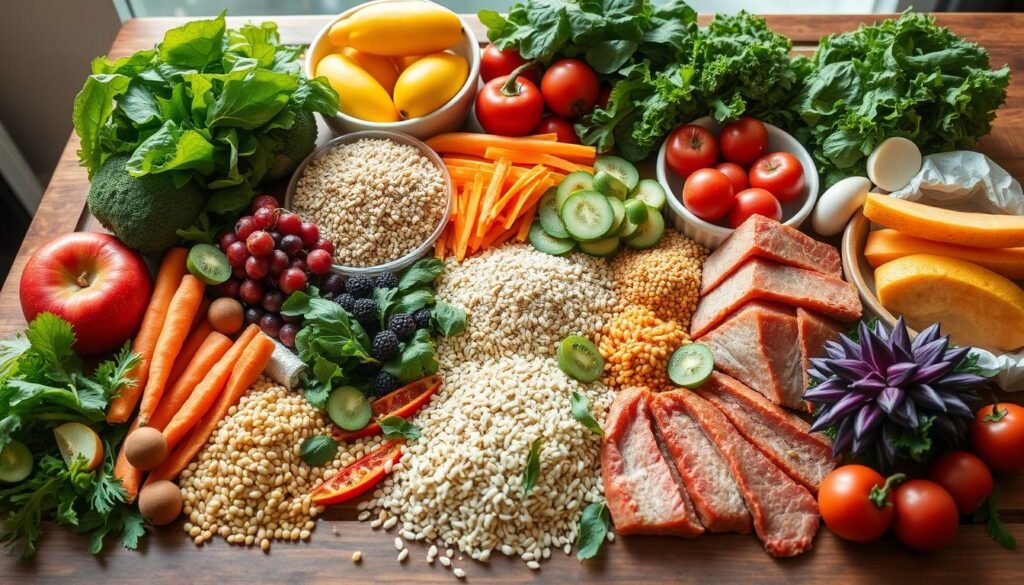Did you know 60% of pregnant people feel really tired in the first trimester? This tiredness is a big challenge. It comes from both physical and hormonal changes. Being very tired during pregnancy affects how you feel, your mood, and what you do every day. In this article, we talk about personal stories of dealing with this tiredness. By sharing stories from moms who have been there, we want to help and give advice to others feeling the same.
Key Takeaways
- About 60% of pregnant individuals experience fatigue, especially in the first trimester.
- Fatigue can significantly affect mood due to hormonal fluctuations.
- Practical tips for managing fatigue include prioritizing rest and creating a supportive environment.
- Real stories from mothers can provide encouragement and relatability during challenging times.
- Understanding common symptoms aids in coping with pregnancy fatigue.
Understanding Pregnancy Fatigue
Pregnancy fatigue is common and often starts early. It typically begins within the first week after conception. Many women feel tired during the first 12 weeks of pregnancy. Understanding this exhaustion is key since it impacts daily life. The body goes through many changes, like hormonal shifts, during this time. These changes, especially the rise in progesterone, increase the body’s energy needs.
Studies show that 94.2% of pregnant women feel some fatigue. This fatigue gets worse as the pregnancy goes on. Fatigue scores start at 23.53 in the first trimester. Then they go up to 25.78 in the second and reach 26.46 in the third. It’s vital to know these pregnancy fatigue symptoms. They affect overall health, especially if the tiredness suddenly disrupts daily activities.
To fight off fatigue, experts suggest at least 150 minutes of moderate exercise a week. Eating foods high in iron can help avoid anemia, keeping energy levels steady. Eating smaller meals through the day can help keep blood sugar levels even. Staying properly hydrated is also key to keeping up energy and reducing tiredness.
Common Pregnancy Fatigue Symptoms
Pregnancy makes a woman’s body go through many changes. One common experience is feeling really tired. Expecting moms often face different levels of fatigue during pregnancy. Knowing why you’re so tired can help you handle it better.
Hormonal Changes
Pregnancy causes your hormones to change a lot. This is mainly due to more estrogen and progesterone in your body. These hormones can make you feel sleepy and sometimes sick to your stomach. In the first 12 weeks, adjusting to these changes can be tough.
The body also works on making the placenta and increases blood volume. This is why many women feel wiped out. About 60 percent of pregnant women feel really tired in the third trimester. Their bodies are working extra hard to help the baby grow. For more info on this, look at this resource.
Emotional Impact
Being pregnant can also affect your emotions a lot. Expecting moms may deal with worry, mood changes, and stress about becoming a parent. These feelings can make the tiredness even worse. It can be hard to keep up with everyday things. Trouble sleeping can come from these emotional issues too. This can start a tough cycle of feeling exhausted that’s hard to break.
Support from loved ones or doing things like prenatal yoga can help. It’s important to look after your emotional health as well as your physical symptoms. This helps you manage tiredness during pregnancy better. For more details, visit this informative article.
| Symptom | Description | Pregnancy Stage |
|---|---|---|
| Persistent Sleepiness | Feeling overwhelmingly tired regardless of sleep quality. | Early Pregnancy & Third Trimester |
| Irritability | Heightened mood swings and emotional sensitivity. | All Trimesters |
| Difficulty Completing Tasks | Struggling with everyday responsibilities and routines. | Especially in Early Pregnancy |
| Physical Exhaustion | Overall fatigue increased by hormonal and physical changes. | Third Trimester |
This info helps us understand the different reasons for pregnancy fatigue. It comes from hormonal changes and the stress of expecting a baby. Many women go through this during their pregnancy journey.
Personal Experiences with Pregnancy Fatigue
Pregnancy fatigue is like a shadow that follows women expecting a baby. Many share stories of how this deep exhaustion touches their lives. Some feel it as early as 8 weeks into their pregnancy. One woman needed to sleep three extra hours every afternoon. This changed her nighttime routine to an earlier sleep schedule.
At first, she didn’t have the usual signs before her period, which was odd. Things changed when she started feeling sick and began vomiting. These stories show how tough early pregnancy can be. The body deals with big hormone changes, including a rise in progesterone.
During the first three months, women go through various symptoms. They might need to pee a lot, have back pain, headaches, and stomach problems. All these, plus needing more blood for the baby, can make them feel very tired.
About 20 percent of pregnant women begin with low iron levels. This can make them even more tired. Low iron might also cause problems, showing why it’s key to watch one’s health at this time. These real stories show that tiredness in pregnancy is both common and unique to each person. They tell of the personal struggles and strength in facing fatigue.
How Long Does Pregnancy Fatigue Last?
Pregnancy fatigue is common for many women, mainly in the first and third trimesters. It helps to know how long this tiredness lasts to set the right expectations. In the beginning, hormonal shifts make you very tired. You may need much more sleep than usual.
The second trimester brings a wave of energy for most. This change can lift your mood and let you do more daily tasks. It shows that early pregnancy fatigue won’t last forever.

But, the third trimester might bring back the fatigue. This is due to less sleep and more discomfort. Being aware lets mothers-to-be adjust their day to find more rest and eat well. Taking short breaks, drinking plenty of water, and focusing on good sleep help fight the fatigue. For more tips on dealing with tiredness, read this article.
Why Am I So Tired During Pregnancy?
Pregnancy brings many physical changes that can cause extreme tiredness. Many women feel very tired in the first trimester. Knowing the reasons for this tiredness can help manage energy better.
Physical Changes and Their Effects
Huge physical changes occur during pregnancy, like hormonal shifts and more blood volume. The increase in progesterone makes you feel very tired, especially early on. The body needs more energy to help the fetus grow. This makes many women feel more tired than usual.
Also, having more blood means your heart and lungs work harder. This can make you feel tired too. It makes women wonder why they feel so tired during pregnancy.
Sleep Disruptions and Insomnia
Pregnant women often have trouble sleeping, which makes them feel even more tired. Nighttime trips to the bathroom, discomfort, and worry can cause insomnia. Not sleeping well can affect your daily life and well-being.
To handle sleep problems, try making your bedtime routine calming. Drink enough water during the day but not too much before bed. Doing some exercise every day can help you sleep better and fight off tiredness.
| Factor | Description |
|---|---|
| Hormonal Changes | Increased progesterone levels lead to increased tiredness and require more energy. |
| Blood Volume Increase | Doubling of blood volume to supply the fetus can cause rapid heart rates and fatigue. |
| Sleep Disruptions | Frequent urination and discomfort contribute to insomnia and exacerbate tiredness. |
| Low Iron Levels | Though less common early on, low iron can lead to significant fatigue later in pregnancy. |
Coping with Pregnancy Fatigue: Tips and Strategies
Coping with pregnancy fatigue can be tough. Energy levels often change during this time. It’s crucial to use practical tips to handle fatigue. Small changes in daily habits can boost your rest and energy.
Prioritizing Rest and Sleep
Getting a consistent sleep routine is key to fighting tiredness. Having a fixed bedtime helps your body’s clock. Taking short naps can also refresh you and lift your spirits. Listen to your body and rest more when needed.
Creating a Relaxing Sleep Environment
Creating the right sleep setting is very important. Your bedroom should be dark, cool, and quiet for better sleep. Using blackout curtains and white noise machines helps. Adding relaxation techniques, like meditation or gentle stretching, aids in calming down.
To find more ways to deal with fatigue, check out resources like coping with pregnancy fatigue. The research highlights knowing your own needs. Getting support from loved ones is also key.
Focusing on rest and making your sleep space peaceful is good for you. Learning about tips for managing pregnancy fatigue can help you adapt. This makes pregnancy more enjoyable.
Dealing with Tiredness During Pregnancy
Feeling tired is common during pregnancy. This happens as your body changes. One reason for this is poor sleep. This is often due to needing the bathroom frequently at night. It leads to feeling sluggish the next day.
As the pregnancy goes on, the extra weight can make you more tired. It’s important to rest enough. Tips for better rest include:
- Changing work hours for more rest time.
- Taking help from others when feeling tired.
- Doing light exercises, like prenatal fitness classes, after talking to a doctor.
Eating well helps fight tiredness. A balanced diet boosts your energy. Make sure to include enough iron in your diet. Iron helps prevent tiredness. Try to sleep at least eight hours a night and take short naps during the day.
To sleep better, make your sleeping area cozy. Sleeping on your side with pillows for support helps. It can also make sleeping safer for the baby. Avoid drinking a lot of fluids before bed and stay away from caffeine. This helps you sleep more soundly.
Understanding these tips helps you cope better with tiredness. Embrace how you feel and look for ways to feel better. Taking care of yourself is key.
Healthy Eating Habits to Combat Fatigue
Nutrition is key in fighting pregnancy fatigue. Eating healthy helps keep energy up during pregnancy. Expectant mothers need balanced meals and should not forget about drinking enough water.
Importance of Balanced Nutrition
A balanced diet is crucial for pregnant women to beat tiredness. They need proteins, iron, and complex carbs for energy. At least 80 grams of protein a day is recommended, sometimes up to 120 grams. Foods like whole grains and sweet potatoes keep energy up for longer, reducing fatigue.
| Food Group | Examples | Benefits |
|---|---|---|
| Protein | Low-fat milk, yogurt, beans, chicken breast, peanut butter | Supports muscle health and energy levels |
| Complex Carbohydrates | Whole grains, sweet potatoes, fruits | Provides sustained energy |
| Iron-rich Foods | Red meat, spinach, lentils | Helps prevent anemia and fatigue |
| Folate-rich Foods | Leafy greens, beans, citrus fruits | Supports neural tube development |
Staying Hydrated During Pregnancy
Drinking enough water is critical for fighting fatigue in pregnancy. Mothers-to-be should drink half their body weight in ounces daily. This means at least ten 8-ounce glasses. Good hydration prevents dehydration and the extra tiredness it brings. Starting the day with light exercise and water can help keep energy levels steady.

Real Stories of Pregnancy Fatigue
The journey of motherhood is a mix of feelings and hurdles. Fatigue during pregnancy is a common challenge. Many women share their experiences to show the real stories of pregnancy fatigue. Rachel’s story is particularly moving. She overcame Addison’s disease and other obstacles on her way to motherhood. She had a miscarriage and, after three years of trying, found out she was pregnant in January 2019.
Rachel worked with a team of doctors during her pregnancy. She adjusted her medication as needed. Despite morning sickness and gestational diabetes, she bravely faced motherhood’s challenges. Her son was born nearly a month early and needed hospital care. Rachel dealt with a lot of anxiety and struggled with fear and panic attacks during her first three months as a mom.
Another story is about a 46-year-old woman who finally had a baby after ten years of trying. This story comes from UT Southwestern. It shows that more women over 35 are having babies, which brings new hopes and risks. Staying educated on potential health issues is very important during this time. Rachel is now studying to become a Perinatal and Infancy Psychologist. Her goal is to support and understand other moms on their journey.
These real stories of pregnancy fatigue show how sharing can create comfort and unity among mothers. It raises awareness about the emotional and physical challenges of pregnancy fatigue. Support systems are crucial for building resilience in mothers.
For more insights on pregnancy later in life, check out this resource.
Support for Pregnant Women with Fatigue
Finding the right support is key for those experiencing pregnancy fatigue. A strong support network allows moms-to-be to share their experiences. They get to lighten their load with others’ help and kindness.
This piece highlights the role of loved ones and professionals in providing support.
Seeking Help from Loved Ones
Being pregnant can feel overwhelming, especially with fatigue. Loved ones provide much-needed emotional and practical support. They help in many ways, like:
- Helping with household chores
- Providing meals or running errands
- Offering emotional encouragement and companionship
- Giving opportunities to rest or take breaks
Having support reduces feelings of being alone. It helps mothers feel understood, easing stress from fatigue.
Professional Support Options
Besides family and friends, professionals can help with persistent fatigue during pregnancy. Available options include:
- Counseling or therapy for emotional challenges
- Support groups to share experiences and tips
- Consultations with healthcare providers for health issues
Professional support helps pregnant women find ways to manage their fatigue. Combining personal and expert advice is crucial.

Exercise: A Key to Overcoming Pregnancy Fatigue
Regular exercise is crucial in beating pregnancy fatigue. It boosts energy levels and improves sleep. Activities like walking or prenatal yoga increase strength and stamina.
A U.S. study showed only 16.0% of pregnant women exercise enough. They should move more to fight fatigue and get ready for birth.
- Walking, swimming, and cycling are excellent for pregnant women.
- Light weight exercises strengthen muscles.
- Make sure to warm up and cool down in your routine.
Changes in pregnancy can impact balance and breathing. To stay safe, dress right, wear good shoes, and drink plenty of water. Stop exercising if you feel pain, dizzy, or short of breath.
Exercise helps control weight and boosts mood and sleep. By staying active, women can handle pregnancy fatigue better. This leads to a healthier pregnancy.
Conclusion
Many expecting mothers deal with pregnancy fatigue. It’s a big challenge during this important time. A lot of pregnant women say they feel very tired. This can be because of hormone changes or discomfort.
By knowing why they feel tired, women can handle their feelings and physical changes better. This helps lessen the hard feelings that come with being pregnant.
Talking about your feelings and learning from others can really help. If you look for emotional support from loved ones or professionals, you’ll likely feel better. This can make you less tired.
It also helps to rest, eat well, and do some light exercise. These actions can make dealing with pregnancy fatigue easier. It lets women enjoy this special time more.
Listening to your body is key to taking care of yourself. Pregnancy is a special journey with its own challenges. But with support and the right ways to cope, future moms can get through this time. They’ll be strong and ready for what’s next.